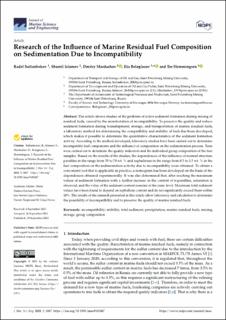| dc.contributor.author | Sultanbekov, Radel | |
| dc.contributor.author | Islamov, Shamil | |
| dc.contributor.author | Mardashov, Dmitry | |
| dc.contributor.author | Beloglazov, Ilia | |
| dc.contributor.author | Hemmingsen, Tor | |
| dc.date.accessioned | 2023-03-09T15:23:11Z | |
| dc.date.available | 2023-03-09T15:23:11Z | |
| dc.date.created | 2021-11-08T17:38:49Z | |
| dc.date.issued | 2021 | |
| dc.identifier.citation | Sultanbekov, R., Islamov, S., Mardashov, D., Beloglazov, I., & Hemmingsen, T. (2021). Research of the influence of marine residual fuel composition on sedimentation due to incompatibility. Journal of Marine Science and Engineering, 9(10), 1067. | en_US |
| dc.identifier.issn | 2077-1312 | |
| dc.identifier.uri | https://hdl.handle.net/11250/3057464 | |
| dc.description.abstract | The article shows studies of the problem of active sediment formation during mixing of residual fuels, caused by the manifestation of incompatibility. To preserve the quality and reduce sediment formation during transshipment, storage, and transportation of marine residual fuels, a laboratory method for determining the compatibility and stability of fuels has been developed, which makes it possible to determine the quantitative characteristics of the sediment formation activity. According to the method developed, laboratory studies have been carried out to determine incompatible fuel components and the influence of composition on the sedimentation process. Tests were carried out to determine the quality indicators and the individual group composition of the fuel samples. Based on the results of the studies, the dependences of the influence of normal structure paraffins in the range from 55 to 70 wt. % and asphaltenes in the range from 0.5 to 3.5 wt. % in the fuel composition on the sedimentation activity due to incompatibility were obtained. To obtain a convenient tool that is applicable in practice, a nomogram has been developed on the basis of the dependences obtained experimentally. It was also determined that, after reaching the maximum values of sediment formation with a further increase in the content of n-paraffins, saturation is observed, and the value of the sediment content remains at the same level. Maximum total sediment values have been found to depend on asphaltene content and do not significantly exceed them within 10%. The results of the research presented in this article allow laboratory and calculation to determine the possibility of incompatibility and to preserve the quality of marine residual fuels. | en_US |
| dc.language.iso | eng | en_US |
| dc.publisher | MDPI | en_US |
| dc.rights | Navngivelse 4.0 Internasjonal | * |
| dc.rights.uri | http://creativecommons.org/licenses/by/4.0/deed.no | * |
| dc.title | Research of the influence of marine residual fuel composition on sedimentation due to incompatibility | en_US |
| dc.type | Peer reviewed | en_US |
| dc.type | Journal article | en_US |
| dc.description.version | publishedVersion | en_US |
| dc.rights.holder | The authors | en_US |
| dc.subject.nsi | VDP::Teknologi: 500 | en_US |
| dc.source.volume | 9 | en_US |
| dc.source.journal | Journal of Marine Science and Engineering | en_US |
| dc.source.issue | 10 | en_US |
| dc.identifier.doi | 10.3390/jmse9101067 | |
| dc.identifier.cristin | 1952491 | |
| cristin.ispublished | true | |
| cristin.fulltext | original | |
| cristin.qualitycode | 1 | |

